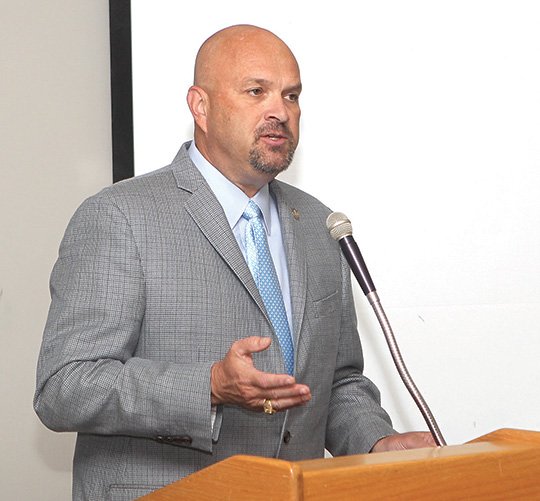Garland County has been selected as a target area for an education and prevention program aimed at decreasing the number of deaths caused by opioid overdoses.
The drug overdose prevention death program, organized by the University of Arkansas System's Criminal Justice Institute and the Arkansas state drug director's office, kicked off with a summit Tuesday at CHI St. Vincent Hot Springs.
Panelists expressed concern that opioid addiction rates in Arkansas will likely get worse, especially as more states in the region are seeing higher numbers of not only addiction but also deaths from the abuse of prescription drugs, heroin and fentanyl, a synthetic opioid up to 100 times as potent as heroin.
Via the analysis of specific variables, program administrators identified counties in the state most at-risk for overdose deaths, opiate-related arrests, treatment admissions and opioid distribution by prescription. Garland County ranked among the top. Other counties selected for the program include Marion, Baxter, Crawford, Franklin, Sebastian and Scott.
In 2016, Arkansas had around 400 deaths from opioid overdoses, a figure likely twice as high due to underreporting by coroners, Kirk Lane, Arkansas state drug director, said.
That same year, the state ranked second in the United States in terms of the number of prescriptions given out per 100 people. The national average in 2016 was 66.5 prescriptions per 100 people. In Arkansas, that figure was 114.6 per 100. In Garland County, the figure jumped to 176.3.
"It is a crisis," Lane said, adding that the high rates of prescriptions in Arkansas boils down to an entire supply chain, from doctors and politicians to pharmaceutical companies, making money.
Even more concerning is what he sees as a coming fentanyl epidemic, he said. The synthetic opioid, which is made in China and imported to the U.S. via Mexico and Canada, is emerging as a problem in Arkansas. Due to its potency, it is more lethal than other drugs, and also much cheaper, which means more people end up using it when they can no longer afford doctor-prescribed opiates. In Little Rock, he said, emergency responders are reporting more deaths from the lethal combination of fentanyl combined with heroin.
"It is a very cheap, potent drug and very dangerous and very deadly," Lane said. "It is a perfect storm for fentanyl to be coming into Garland County."
Another panelist, Andy Bryan, an emergency room doctor at CHI St. Vincent, said the number of overdose patients he sees in the ER as well as patients who are addicted to painkillers or who are withdrawing from opioids, is on the rise. He described demographics as predominantly white, from a lower socioeconomic status and lacking a high school education.
"Personally, we see a big problem, and as much as our state has done, it is not enough," Bryan said. "We still all get exposed to a lot of it. It is difficult to deal with. Our job would be a whole lot easier if the problem didn't exist, but I don't know the answer to it."
Aside from trying to create more awareness in communities, the program is working with first responders, providing them with Narcan, an opioid overdose treatment.
Cheryl May, director of the U of A Criminal Justice Institute, said it is imperative first responders carry Narcan, particularly given the lethal nature of fentanyl, which can sometimes cause death if absorbed by the skin or accidentally inhaled.
"Fentanyl is causing more and more drug overdose deaths," May said. "More and more is coming into this state and into this country."
The program is also working to raise awareness about a good Samaritan law whereby individuals will not be arrested for drug possession if they seek medical assistance for someone who is overdosing.
Local on 06/06/2018
